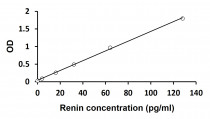ARG80884
Human Renin (High sensitive) ELISA Kit
Human Renin (High sensitive) ELISA Kit for ELISA and Human
Cell Biology and Cellular Response kit; Metabolism kit; Signaling Transduction kit
Overview
| Product Description | ARG80884 Human Renin (High sensitive) ELISA Kit is a high sensitive Enzyme Immunoassay kit for the quantification of Human Renin in serum and plasma (EDTA). Renin measurements are used in the research for certain types of hypertension. |
|---|---|
| Tested Reactivity | Hu |
| Tested Application | ELISA |
| Target Name | Renin |
| Conjugation | HRP |
| Conjugation Note | Substrate: TMB and read at 450 nm |
| Sensitivity | 0.81 pg/ml |
| Sample Type | Serum and plasma (EDTA). |
| Standard Range | 4 - 128 pg/ml |
| Sample Volume | 50 µl |
| Alternate Names | EC 3.4.23.15; Angiotensinogenase; HNFJ2; Renin |
Application Instructions
| Assay Time | 90, 90 (RT/shaker), 15 min (RT) |
|---|
Properties
| Form | 96 well |
|---|---|
| Storage Instruction | Store the kit at 2-8°C. Keep microplate wells sealed in a dry bag with desiccants. Do not expose test reagents to heat, sun or strong light during storage and usage. Please refer to the product user manual for detail temperatures of the components. |
| Note | For laboratory research only, not for drug, diagnostic or other use. |
Bioinformation
| Database Links | |
|---|---|
| Gene Symbol | REN |
| Gene Full Name | renin |
| Background | Renin is an enzyme (Mw of 37 kDa) that belongs to the aspartic acid protease family. Renin is a member of Renin-Angiotensin-Aldosterone System (RAAS) that controls blood pressure, renal blood flux, glomerular filtration, and sodium/potassium homeostasis. Renin is produced constitutively as prorenin, an inactive precursor with 386 amino acids, in the juxtaglomerular cells of the kidney. In response to low intra-renal blood pressure, reduced sodium reabsorption, hypokalemia or activity of the sympathetic nervous system, active renin can be released either from a depot in the kidney or generated from prorenin by cleavage of 46 amino acids at the N-terminus of prorenin. Prorenin secretion into the blood is continuous, in contrast to the tightly controlled release of renin, and blood concentration of prorenin is approx. 100-fold higher than active renin. After release and activation, soluble renin mediates cleavage of the a2-globulin angiotensinogen into the precursor peptide angiotensin I, which ultimately is processed by angiotensin converting enzyme (ACE) to the octapeptide angiotensin II. All actions of angiotensin II are mediated by the G protein-coupled angiotensin type 1 (AT1) and angiotensin type 2 (AT2) receptors. Direct physiological effects of Angiotensin II include vasoconstriction, increase of tubular reabsorption of sodium and chloride, water retention, and release of the hormones aldosterone from adrenal cortex, antidiuretic hormone (ADH, Vasopressin) from posterior pituitary, and adrenocorticotropic hormone (ACTH, Corticotropin) from anterior pituitary. Release of these hormones further supports sodium retention and secretion of potassium/H+ in the kidney, and increases thirst sensation and the desire for salt through the subfornical organ of the brain. In a negative feedback loop, renin secretion is reduced by high concentration of angiotensin II, and release of aldosterone is lowered by potassium depletion. Beside the action of soluble renin, binding of renin and prorenin to the membrane-bound renin receptor ATP6AP2 in brain, heart, placenta, liver, kidney and pancreas enhances efficiency of angiotensinogen cleavage and induces angiotensin-independent intra-cellular effects by activating mitogen activated kinases ERK1 and ERK2. Plasma renin is a good index for the activity of the RAAS. In case of dysfunction of the RAAS, the Renin assay will allow clinical implications for diagnosis, treatment, and follow up. Active renin should be measured in: - Diagnosis of hypertension (high blood pressure: if diastolic blood pressure is > 90 mm Hg and systolic blood pressure is > 140 mm Hg; guideline of the European Society of Cardiology and the European Society of Hypertension) - Differential diagnosis of hyperaldosteronism (primary hyperaldosteronism, secondary hyperaldosteronism with or without hypertension, pseudo-hyperaldosteronism) - Diagnosis of isolated deficit in mineral corticoids - Differential diagnosis of hypokalemia (secondary hyperaldosteronism or primary hypermineralcorticism) - Detection of Renin producing tumors in the kidney - Monitoring of glucocorticoid therapy - Diagnosis of insufficient response to antihypertensive treatment |
| Highlight | Related products: Renin antibodies; Renin ELISA Kits; New ELISA data calculation tool: Simplify the ELISA analysis by GainData |
| Research Area | Cell Biology and Cellular Response kit; Metabolism kit; Signaling Transduction kit |
Images (1) Click the Picture to Zoom In
| Title | Download Link |
|---|---|
| ARG80884 Human Renin (High sensitive) ELISA Kit User's manual |
 Download Download
|






